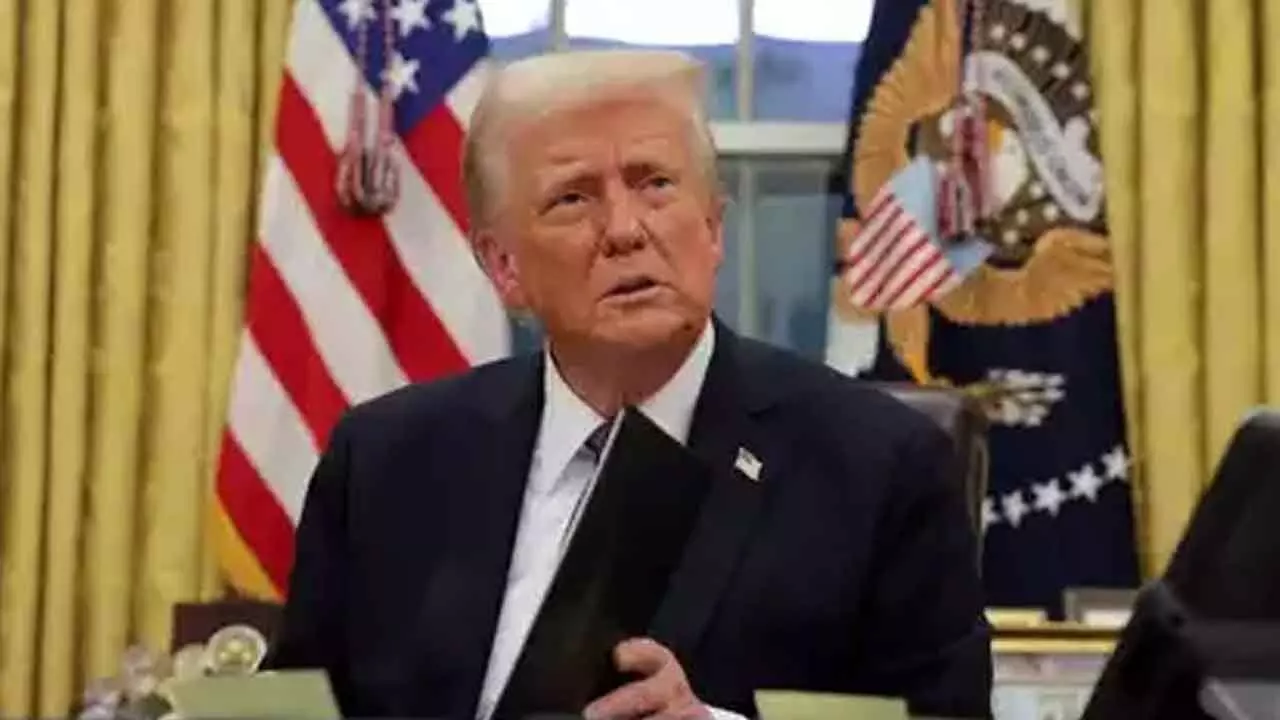Trump Imposes New Tariffs on Mexico, China, Markets React
Trump’s new tariffs on Mexico and China spark market declines and global retaliation, raising concerns over economic impact.
image for illustrative purpose

President Donald Trump has announced a new round of tariffs targeting imports from Mexico and China, triggering immediate backlash from international leaders and financial markets. The administration claims the measures aim to protect American industries and jobs, though concerns have mounted over potential economic retaliation and rising consumer costs.
Financial markets responded with significant losses following the announcement. The Dow Jones Industrial Average suffered a sharp decline, with similar drops seen across European and Asian markets. Analysts warn that companies dependent on imports could face major disruptions, potentially leading to job losses and increased prices for consumers.
India's benchmark indices also felt the impact, as the BSE Sensex plunged 731.91 points to 76,774.05, and the NSE Nifty declined 243 points to 23,239.15. The global market downturn has intensified fears of a broader economic slowdown.
In response, Mexico, Canada, and China have introduced countermeasures against U.S. products. Mexico has targeted American steel, bourbon, and dairy products, while Canada has announced a 25 per cent tariff on $30 billion worth of U.S. imports, effective Tuesday. China is also expected to impose additional restrictions on American exports, adding to trade tensions.
President Trump spoke with Canadian Prime Minister Justin Trudeau regarding the tariffs. While the discussion included possible exemptions for Canada, no agreement was reached. Trudeau warned of economic consequences for North America, emphasizing that Canada would respond as necessary. Trump reiterated his stance, calling the tariffs essential to counter what he labeled as unfair trade practices.
A variety of goods are expected to become more expensive due to the tariffs. Products sourced from China, including electronics such as smartphones and laptops, could see price hikes. Imports from Mexico, particularly automobiles and food products like avocados, are also likely to become more costly. Retailers caution that the increased costs will eventually be passed on to consumers.
The tariffs have also influenced global currency markets. The U.S. dollar strengthened, rising 0.7 per cent against the Chinese yuan to 7.2552 and gaining 2.7 per cent against the Mexican peso, which fell to 21.40. The Canadian dollar dropped 1.4 per cent, while the euro declined 2.3 per cent. Cryptocurrency markets also experienced volatility, with Bitcoin falling 4.4 per cent and Ether declining 15 per cent.
Trump defended the policy, acknowledging potential short-term economic strain but emphasizing long-term benefits. “This is about making America stronger,” he stated. “There may be some short-term pain, but in the end, we will see the results.”
He urged businesses to shift production to the U.S., arguing that domestic manufacturing would eliminate the need for tariffs. “If you make your products in America, there are no tariffs,” Trump said, criticizing foreign trade policies and reaffirming his commitment to reducing trade deficits.
U.S. manufacturers relying on imported materials have raised concerns about increased costs. Car manufacturers and technology firms warn that tariffs could force them to either cut jobs or move operations abroad. Business groups argue that while tariffs might offer temporary relief for certain industries, they risk long-term economic harm. Many industry leaders are advocating for negotiations instead of unilateral tariff impositions.
Trump suggested that additional tariffs on the European Union could be considered. However, he indicated that Britain might be spared for now, citing discussions with Prime Minister Keir Starmer. The president criticized the EU’s trade surplus with the U.S. and signaled possible future actions if negotiations fail.
Major trade organizations, including the U.S. Chamber of Commerce, have strongly opposed the tariffs, warning that protectionist policies could stifle economic growth. Critics argue that increasing trade barriers may lead to economic instability and weaken America’s global financial standing. Calls for policy revisions continue to grow among business leaders and economic experts.
Experts predict ongoing negotiations between the U.S. and its trade partners, though uncertainty remains. Some analysts believe modifications or exemptions could be introduced to ease economic strain, while others fear an extended trade dispute that could impact global markets for years. Trump has hinted at further tariffs should China and Mexico fail to meet U.S. demands, leaving the future of international trade relations uncertain.

